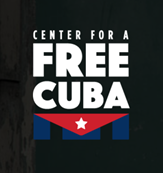To promote a peaceful transition to a Cuba that respects human rights
and political and economic freedoms

Alerting the world to Luis Manuel Otero Alcántara's ongoing hunger and thirst strike and remembering Heberto Juan Padilla's coerced confession in 1971

Heberto Padilla (1971) and Luis Manuel Alcántara (2021): Two artists targeted by Castro regime for their freedom of expression
Over the past sixty two years the space for artistic expression in Cuba has been under attack. Today, Cuban artist Luis Manuel Otero Alcántara, a leading figure in the San Isidro Movement, is on a hunger and thirst strike demanding that "the state of siege that has remained on his home since November 2020 be lifted; Return of his works of art and corresponding compensation for the damage they have caused; respect for the full exercise of artistic freedoms for all Cuban artists," reports independent journalist María Matienzo. On November 26, 2020 Luis Manuel's home was raided by secret police posing as doctors, and everyone was arbitrarily detained and taken away. The next day at the Ministry of Culture hundreds of Cuban artists and intellectuals gathered outside the entrance in nonviolent protest. Out of this demonstration emerged the 27N movement.

Luis Manuel Otero Alcántara
The San Isidro Movement came into existence in 2018 protesting the Castro regime's Decree 349, a new law that further restricted artistic freedoms in Cuba, and that Amnesty International described as dystopian. According to Amnesty, "under the decree, all artists, including collectives, musicians and performers, are prohibited from operating in public or private spaces without prior approval by the Ministry of Culture."
Times have changed, and the protests of these artists have circled the world, and the Castro dictatorship has been exposed for the tyranny that it is.
It was not always this way. The Castro regime was able to operate with complete impunity between 1959 and 1971, and many in the international community refused to listen to the victims, almost nobody listened but fifty years ago that began to change.

Herberto Juan Padilla, a Cuban poet, who like many had been an enthusiastic supporter of Fidel Castro ousting Cuban dictator Fulgencio Batista in 1959, became disillusioned when the Castro regime's dictatorial nature became clear, and reflected it in his writings. In 1968, however, Cuban judges in the national poetry contest awarded their "Julian del Casal" poetry prize to Padilla's collection, Fuera del Juego (Out of the Game), which contained critical lines such as:
"The poet! Kick him out!
He has no business here.
He doesn't play the game.
He never gets excited
Or speaks out clearly.
He never even sees the miracles ..."
The book was published but an addendum was added that criticized the work as counterrevolutionary, and Herberto Padilla was placed under house arrest. On March 20, 1971 Herberto Padilla and Belkis Cuza Malé's home was raided by armed state security agents at seven in the morning and they were arbitrarily detained. Belkis was held incommunicado for three days and released. Herberto was interrogated for over a month and psychologically tortured by the secret police and on April 27, 1971 taken to confess before the National Union of Writers and Artists of Cuba (Unión Nacional de Escritores y Artistas de Cuba, UNEAC) his counter-revolutionary tendencies. Cuban literary critic José Antonio Portuondo served as the moderator and introduced Herberto Padilla to the gathered group, and the numerous cameras of the official press. Below is an excerpt of a video from the event.
Artists and intellectuals wrote two open and public letters to Fidel Castro about Herberto Padilla, the first on April 9, 1971, was signed by Carlos Barral, Simone de Beauvoir, Italo Calvino, Josep Maria Castellet, Fernando Claudín, Julio Cortázar, Jean Daniel, Marguerite Duras, Hans Magnus Enzensbeger, Jean-Pierre Faye, Carlos Franqui, Carlos Fuentes, Gabriel García Márquez, Juan Goytisolo, Luis Goytisolo, Alain Jouffroy, André Pieyre de Mandiargues, Joyce Mansour, Dionys Mascolo, Alberto Moravia, Maurice Nadeau, Hélène Parmelin, Octavio Paz, Anne Philipe, Pignon, Jean Pronteau, Rebeyrolle, Rossana Rossanda, Francisco Rossi, Claude Roy, Jean-Paul Sartre, Jorge Semprún, Mario Vargas Llosa, and the second on May 20, 1971 was signed by an even greater number of artists and intellectuals.
The second letter was in reaction to Heberto Padilla's "confession" and expressed their belief that it was their "duty to communicate our shame and anger to you" regarding it and expressed concern for "the contempt for human dignity that involves forcing a man to ridiculously accuse himself of the worst betrayals and vileness does not alarm us because he is a writer, but because any Cuban colleague - peasant, worker, technician or intellectual - may also be the victim of a similar violence and humiliation."




No comments:
Post a Comment